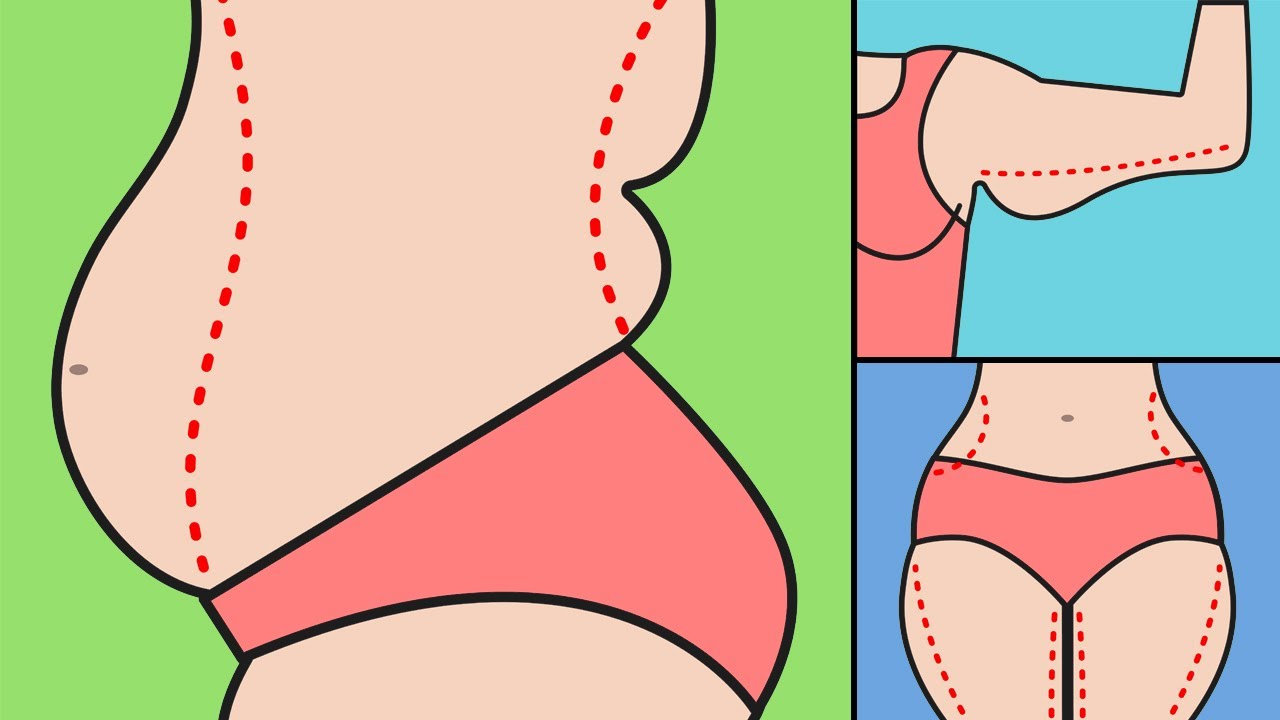9 Bad Habits That Make You Fat
Mention the words ‘weight loss’ and you can certainly spark a debate. Everyone seems to have their own favorite method. But unfortunately, it’s a process much like a yo-yo.
In today’s video we’ll explore 9 bad habits that may be keeping most people from losing that weight and keeping it off.
1. Eating before going to bed
Most likely, we eat late at night because it’s a habit – not because we are hungry. If you were to keep track of all you ate at bedtime for one week, you may notice a pattern. You may be consuming something sweet and high in calories. If you feel you must eat something, select a piece of fruit.
2. Sleeping poorly
Keeping a set sleep schedule should enhance your sleep. If you don’t have any set time to go to bed, your body’s chemistry may get out of synch.
This creates hormonal imbalances that trick you into believing you will only be satisfied if you eat.
3. Eating while distracted
Flopping down on the couch to watch TV after a long day can be relaxing. But before long you may begin to snack without even paying attention to what you are consuming. The American Journal of Clinical Nutrition conducted a study that revealed distractions result in a person eating 50 percent more calories. Just make sure the next time you sit down with your laptop or tv that snacks don’t mysteriously join you.
4. Stress and anxiety
These two words can be your worst enemies. They can increase your weight and disrupt your quality of life. When we experience these feelings, we are confronted with “emotional hunger.” When this strikes, we tend to eat more. Our immediate urge is to relieve this distress by eating sweets or junk food.
These are indeed serious issues, but if you must eat, try to first consume a piece of fruit with water or tea.
5. Eating quickly
Our generation is always in a hurry. We are a mobile society and eat on the run. Often, we don’t take time to properly chew our food. If we did, we would be more satisfied by feeling full. It generally takes twenty minutes to eat, if we chew each bite slowly.
6. Being sedentary
If we lived in the wild west and rode horses and walked more, we wouldn’t fall victim to a sedentary lifestyle. This is one of the major factors in the global epidemic of obesity. When we sit, we eat. Then fat begins to creep around our midsections and we aren’t so eager to get involved in physical activity.
Make it a goal to avoid too much idleness and you’ll be able to shed those pounds easier.
7. Skipping breakfast
If we don’t manage to grab something on the way out the door to work or school, we may just skip breakfast entirely. Most dieticians and health care professionals agree that breakfast is the most important meal of the day. Our food in the morning activates our metabolism. And once that switch is turned on, it tends to stay powered up all day. Without a good metabolism rate, it’s nearly impossible to burn calories. Your first meal of the day should include proteins, a small portion of a healthy fat food, and combined complex carbohydrates.
8. Excessive salt
An accumulation of salt isn’t good for your weight, but it can also cause fluid retention. When there’s too much fluid, this may have a negative impact on your blood pressure. If flavor is what you are looking for, try other ways to spice up your meal.
9. Not consuming enough liquids
Our kidneys, among other organs, have difficulty functioning properly when they don’t have enough water. For one thing, toxins can accumulate. To stay hydrated, experts suggest drinking at least 2 liters of water daily. This will lead to better elimination of waste and also prevent excess fluid buildup. One way to stay hydrated is to drink tea or natural juices. Consuming carbonated beverages is not a good source of fluid. This will only lead to weight gain because of their high levels of sugar.
For more information and references, check the article on our blog:
https://www.naturalcures.me
Disclaimer: The materials and the information contained on Natural Cures channel are provided for general and educational purposes only and do not constitute any legal, medical or other professional advice on any subject matter. These statements have not been evaluated by the FDA and are not intended to diagnose, treat or cure any disease. Always seek the advice of your physician or other qualified health provider prior to starting any new diet or treatment and with any questions you may have regarding a medical condition. If you have or suspect that you have a medical problem, promptly contact your health care provider.



![[ID: Hx_A0iLhdr8] Youtube Automatic](https://bizimtube.com/wp-content/uploads/2021/03/id-hxa0ilhdr8-youtube-automatic-236x133.jpg)
![[ID: lp7w0UmpuIs] Youtube Automatic](https://bizimtube.com/wp-content/uploads/2021/03/id-lp7w0umpuis-youtube-automatic-236x133.jpg)
![[ID: s2-7T1TH-lY] Youtube Automatic](https://bizimtube.com/wp-content/uploads/2021/03/id-s2-7t1th-ly-youtube-automatic-236x133.jpg)
![[ID: b_lakC9M4UQ] Youtube Automatic](https://bizimtube.com/wp-content/uploads/2021/03/id-blakc9m4uq-youtube-automatic-236x133.jpg)
![[ID: r44yl6nPONs] Youtube Automatic](https://bizimtube.com/wp-content/uploads/2021/03/id-r44yl6npons-youtube-automatic-236x133.jpg)
![[ID: pAwto1YQjA8] Youtube Automatic](https://bizimtube.com/wp-content/uploads/2021/03/id-pawto1yqja8-youtube-automatic-236x133.jpg)
![[ID: XETG8azHiv4] Youtube Automatic](https://bizimtube.com/wp-content/uploads/2021/03/id-xetg8azhiv4-youtube-automatic-236x133.jpg)
![[ID: f3G_-S_2HUk] Youtube Automatic](https://bizimtube.com/wp-content/uploads/2021/03/id-f3g-s2huk-youtube-automatic-236x133.jpg)
![[ID: G8oWns54snA] Youtube Automatic](https://bizimtube.com/wp-content/uploads/2021/03/id-g8owns54sna-youtube-automatic-236x133.jpg)
![[ID: s0lIFXhu6aw] Youtube Automatic](https://bizimtube.com/wp-content/uploads/2021/03/id-s0lifxhu6aw-youtube-automatic-236x133.jpg)
![[ID: 4UTd2Ev8eYg] Youtube Automatic](https://bizimtube.com/wp-content/uploads/2021/03/id-4utd2ev8eyg-youtube-automatic-236x133.jpg)
![[ID: RKBGBjVJBxQ] Youtube Automatic](https://bizimtube.com/wp-content/uploads/2021/03/id-rkbgbjvjbxq-youtube-automatic-236x133.jpg)